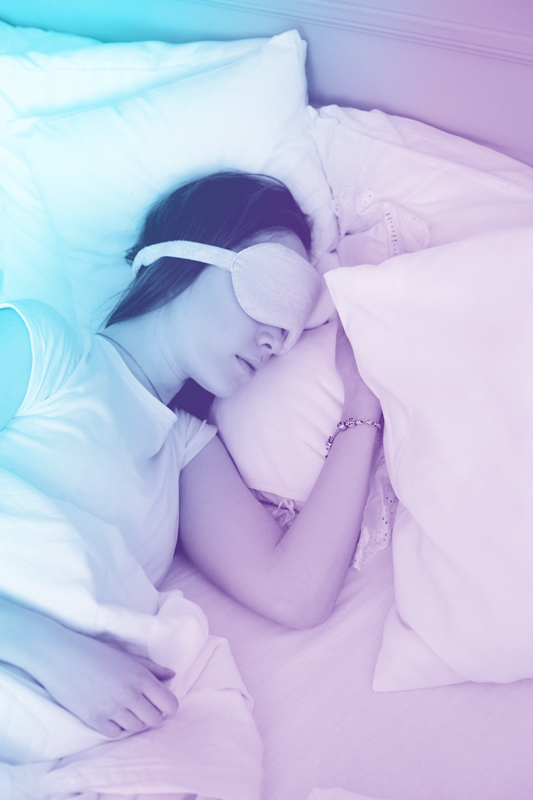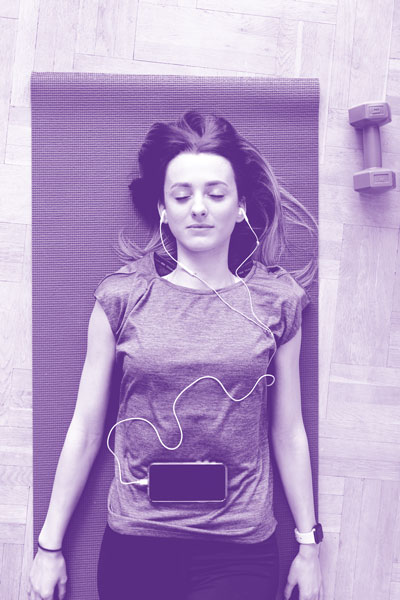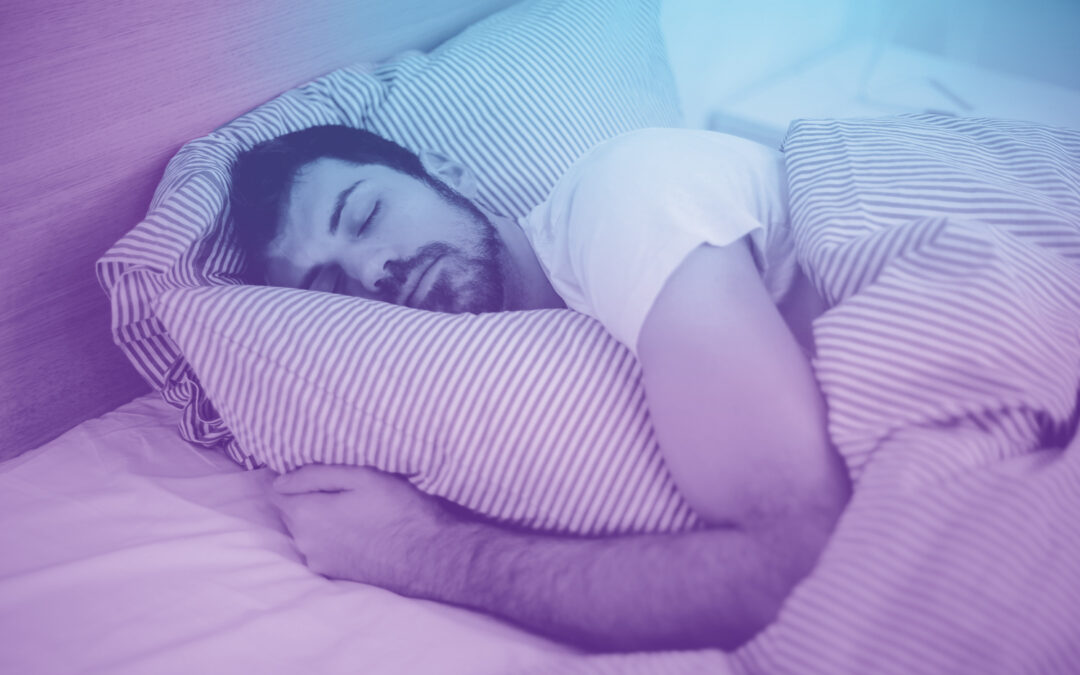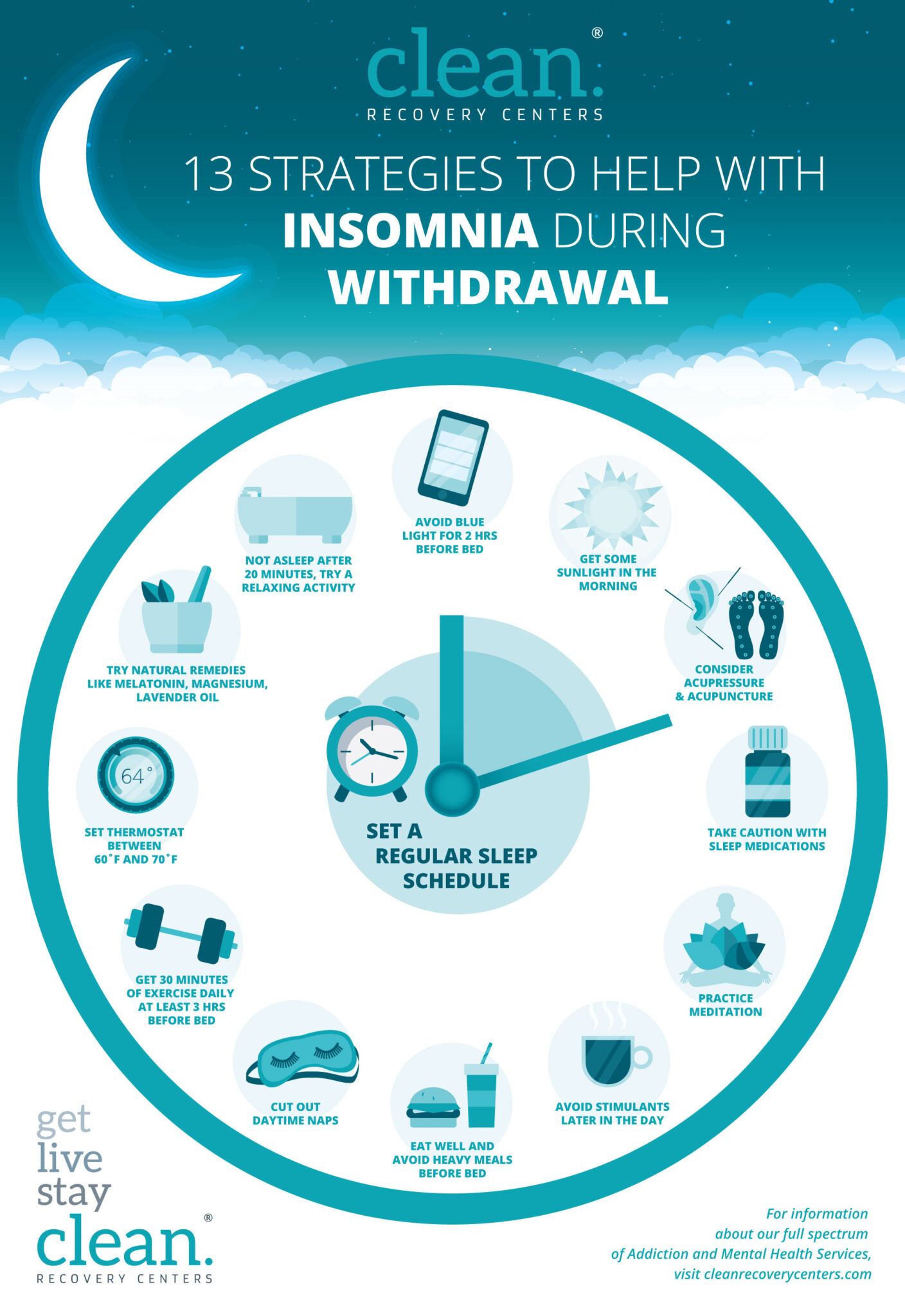13 Strategies To Help With Insomnia During Substance Withdrawal
Recovery from addiction brings uncomfortable physical and psychological symptoms. If you’re on this journey and experiencing withdrawal symptoms, you may notice that you have trouble falling asleep and staying asleep at night. In fact, a 2014 study published in the Journal of Addiction Medicine found that individuals in substance use recovery have a 500% higher incidence of insomnia compared to the general risk.
The effects of insomnia extend beyond sleepless nights. Chronic sleep issues can result in limited energy, loss of motivation, aggression, hyperactivity, inability to stay awake during the day, irritability, difficulty completing responsibilities, attention and memory problems, and ongoing fatigue. These problems can in turn compromise your healthy recovery from substance use.
To help alleviate insomnia during alcohol or drug withdrawal, try these 13 safe strategies that may improve the quality and quantity of your sleep.

SET A REGULAR SLEEP SCHEDULE
You can encourage healthy sleep with a consistent bedtime and wake-up time every day, even on the weekends or when you have off from work or school. This process can help reset your body’s circadian rhythm, which is the clock that helps us stay on a healthy schedule. As you maintain your sleep schedule, you will probably notice that your sleep improves.
KEEP THE LIGHTS LOW
You’ve probably heard that the blue light emitted from your smartphone screen can keep you wide awake. Some studies show that exposure to this type of light before bed prevents the body from releasing melatonin, a natural substance for sleep.
Many of us get in the habit of scrolling through our news feeds at bedtime, but doing so can keep you awake much later than you intend. If at all possible, put your devices away at least two hours before you plan to go to bed. Turn down the lights in your room as well so you can shift your focus to resting.
Infographic
13 Strategies to Help With Insomnia During Withdrawal
View the full Infographic for a quick overview of all 13 tips for overcoming the insomnia that can come along with other withdrawal symptoms.
SPEND TIME IN THE SUN
Just as bright light affects your ability to sleep at night, it helps you feel alert and ready to start the day in the morning. Try to spend at least a few minutes in the sunshine as soon as you rise. On rainy or cloudy days, try a light therapy lamp to provide a similarly energizing effect.
CONSIDER ACUPRESSURE AND ACUPUNCTURE
These techniques, which derive from traditional Chinese medicine, use specific pressure points on the body to promote health and wellness. With acupressure, a trained practitioner applies pressure to various areas based on your symptoms (in this case, insomnia). Acupuncture involves the insertion of tiny needles into points on the body by a licensed professional, also to relieve discomfort, pain and bodily imbalance.
The nonprofit organization Inner Compass Initiative reports that many individuals going through drug and alcohol withdrawal report that acupressure and acupuncture promote relaxation and healthy sleep while reducing feelings of anxiety and depression.
TAKE CAUTION WITH SLEEP MEDICATIONS
Most experts caution against using sleep medications during drug and alcohol recovery, including over-the-counter drugs. In some cases, your doctor may prescribe you something to help you sleep during the first few days of withdrawal, but this depends on the substance you have stopped using, your overall health and other factors.
Make sure you take any sleep medications prescribed by your health care provider exactly as instructed. Some people in this situation develop a dependence on these drugs to sleep or get sick from misusing the medication.
PRACTICE MEDITATION
Many people who struggle with insomnia report relief with meditation and related relaxation techniques, such as guided imagery. Calming music, nature sounds and white noise can also help set the stage for sleep. A 2011 study found that individuals with insomnia who took a weekly meditation class reported better sleep, fewer insomnia symptoms, and fewer symptoms of anxiety and depression.
Incorporating aromatherapy into your sleep routine also promotes relaxation. Some scents that can help you sleep better include lavender, chamomile, vanilla and jasmine.
AVOID NIGHTTIME STIMULANTS
Caffeine and nicotine signal the nervous system that it’s time to stay awake, so avoid these substances in the hour or so before you go to bed. You might also want to limit your liquid intake in the evening if you find that you need to go to the bathroom during the night. Chocolate, spicy meals, and foods high in fat and sugar can also interfere with your sleep, so consider limiting those after lunch.

EAT FOR GOOD SLEEP
Just as some foods can prevent you from sleeping well, other foods can improve the quality of your nightly rest. Leafy greens and legumes (beans) are rich in B vitamins, potassium and magnesium, which promote good sleep. Some research shows that a chemical called tryptophan in meat and dairy induces the release of melatonin and serotonin, which makes us feel sleepy.
You can also switch up your mealtime routine to help you sleep more soundly at night. Try eating small, healthy meals and snacks throughout the day. Avoid a heavy evening meal since filling foods can prevent you from falling asleep.
CUT OUT DAYTIME SLEEP
Napping during the day feels like a solution when you struggle to sleep at night. However, this practice can perpetuate the problem of insomnia. When you’re really exhausted, nap for a maximum of 30 minutes before resuming your day. Otherwise, the disruption to your circadian rhythm can result in chronic sleep problems.
During the day, avoid hanging out in your bed to read or watch TV. Spending time where you sleep signals your brain to stay awake when you’re in your bedroom.

RAMP UP YOUR DAILY EXERCISE ROUTINE
If you don’t already do some type of physical activity for at least 30 minutes a day, adding exercise to your day can help you sleep better at night. Anything counts as long as you increase your heart rate, from shooting hoops in your driveway to taking a walk around your neighborhood. Just avoid exercising for about three hours before bed, since doing so can make it more difficult to fall asleep.
In a 2015 study published in the Journal of Sleep Research, individuals who exercised for a least 150 minutes a week for six months or longer experienced fewer insomnia symptoms and reduced anxiety and depression.
CREATE A SOOTHING SLEEP ENVIRONMENT
Having a comfortable place to lay your head at night can make a big difference in your insomnia symptoms. Make sure your mattress supports your body to prevent aches and pains. Set your thermostat to between 60 and 70 degrees Fahrenheit, which most experts think is the ideal temperature for sleep. If you find that environmental sounds keep you awake, try noise-canceling headphones or play white noise at night to drown out the sound.
TRY NATURAL SUPPLEMENTS
Some supplements can be used to improve sleep. Research indicates the efficacy of 1 to 5 mg of melatonin taken up to two hours before bedtime, 20 to 80 mg of lavender oil capsules each day, or 500 mg of magnesium each day. Discuss any new supplements and over-the-counter medications with your health care provider before use.
TAKE A BREAK
Don’t force yourself to stay in bed if you can’t fall asleep after 20 minutes. Instead, get up and do a relaxing activity. For example, you could read, meditate or take a hot bath. Wait about an hour and try again.
While it can take about six months for sleep patterns to return to normal after you enter recovery, insomnia tends to peak in the first several days after you discontinue substance use. These tips often reduce the amount of time it takes to reach a healthy sleep equilibrium. Talk to your doctor if these methods do not improve your ability to sleep at night. In many cases, cognitive behavioral therapy with a trained professional can aid relief from insomnia.
If you or a loved one struggles with an addiction to drugs or alcohol, you can seek help from Clean Recovery Centers. Reach out today to speak with one of our trained intake counselors within 24 hours.
Infographic
13 Strategies to Help With Insomnia During Withdrawal
View the full Infographic for a quick overview of all 13 tips for overcoming the insomnia that can come along with other withdrawal symptoms.



